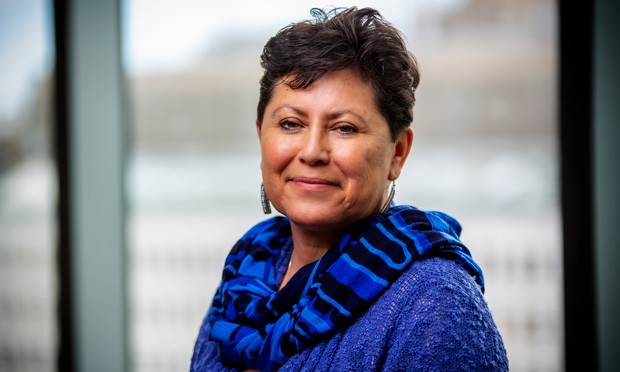notice
February Newsletter: Indigenizing curriculum and pedagogy at Concordia
The second mandate of the forthcoming Action Plan addresses increasing institutional and individual capacity and support for Indigenizing curriculum and pedagogy.
To Indigenize curriculum and pedagogy means to be critical about the perspectives we learned to see the world through; to respectfully and intentionally bring in Indigenous peoples and voices into our classrooms as both guests and faculty; and to make space for Indigenous peoples to speak for themselves, among other things.
There are many Indigenous staff, faculty, and their allies who are doing this work already. One of those people is Donna Kahérakwas Goodleaf.
Donna Kahérakwas Goodleaf, Ed. D., Indigenous Curriculum and Pedagogy Advisor
 Donna Kahérakwas Goodleaf | Photo by Concordia University
Donna Kahérakwas Goodleaf | Photo by Concordia University
“As the Indigenous Curriculum and Pedagogical Advisor at Concordia’s Centre for Teaching and Learning, my role is to develop and implement a university-wide plan on ways to decolonize and Indigenize the academy. In particular, I work with faculty and departments to examine and re-conceptualize their curriculum grounded in critical analysis and discourse, and co-construct ways that reflect the integration of Indigenous epistemologies, perspectives, histories, and pedagogical approaches to teaching and learning in meaningful and respectful ways.
In addition, I created the Seminar Series on Decolonizing and Indigenizing the Academy that was put on in Fall/Winter 2018 to provide foundational knowledge for faculty to learn about what meaningful decolonization and Indigenization of the academy is. This series of workshops on various topics were given by Kahnawake language and cultural knowledge keepers involved in education in my community.”
Read more about Donna’s vision and goals as the Indigenous Curriculum and Pedagogy Advisor at Concordia University.
Reads and Resources for Indigenizing the University
Indigenous Elder and Community Protocols
Last week at the First Voices Week Opening Ceremony, the IDLG unveiled the Indigenous Elder and Community Protocols: Guidelines for Acknowledging Territory and Protocols for Working with Elders, Knowledge Keepers, and Community Members. Written by Wahéhshon Shiann Whitebean, with contributions from Geneviève Sioui, Vicky Boldo, Tiffany Ashoona, and Charlie O’Connor, this document is both a guide and a tool for faculty, staff, and students wanting to work with Indigenous Elders, Knowledge Keepers, and community members as a part of facilitating the Indigenization of the University.
Through the use of this document and the guidelines therein, the IDLG is hopeful that more respectful, intentional, collaborative, and sustained relationships can be formed between Concordia and Indigenous peoples within and beyond the University.
Indigenous Educational Resources for Faculty and Students
Concordia Subject Librarian, Michelle Lake, has created a database of educational resources on Indigenous topics that are readily available for faculty, staff, and students wanting to educate themselves.
How might a non-Indigenous faculty member respectfully Indigenize their curriculum and pedagogy?
Dr. Adrienne Keene (Citizen of the Cherokee Nation) offers some advice:
"Yes, it’s best to have a Native faculty member teach Native Studies. Always. But non-Native faculty can and do subvert systems of power and create space and opportunity—but it needs to be intentional and thoughtful. Is it easy? No. But it’s also not impossible.”
Concordia and Indigenous Directions in the News
First Voices Week, put on by two very hard-working and dedicated students, Sarah Paul and Philippe Boucher with the help of Concordia staff and student volunteers, made it into the news last week with their Inuit carving workshop and a visit from Haudenosaunee and Gwich'in chef Rich Francis.